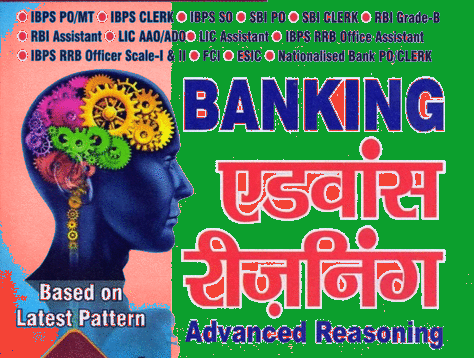Reasoning Notes for Bank Exams 2024 – New Syllabus for Bank Exams PDF
Reasoning ability is an important component of banking exams as it evaluates the candidate's logical thinking, problem-solving skills and ability to interpret data accurately. Since banking roles often involve making decisions based on complex data, strong reasoning abilities are essential for success.
Important Reasoning Topics for Bank Prelims Exam
Let us discuss the important Reasoning topics asked in IBPS PO, IBPS RRB PO and SBI PO exams and get a clear idea about the topics from where most questions are asked and prepare smartly for bank exams.
| Topics | IBPS PO No. of Questions | IBPS RRB PO No of Questions | SBI PO No of Questions |
|---|---|---|---|
| Puzzles and Seating Arrangement | 20 | 20 | 19 |
| Coding Decoding | 5 | 5 | 3 |
| Blood Relations | 3 | 3 | 4 |
| Inequality | 5 | 4 | 3 |
| Miscellaneous (Pair Based Question, alphabetical Question) | 2 | 8 | 6 |
| Total | 35 | 40 | 35 |
Important Reasoning Topics for Bank Mains Exam
We are discussing the important Reasoning topics of IBPS PO, IBPS RRB PO and SBI PO Mains Exam, after qualifying the preliminary exam, students need a proper strategy to crack the mains exam, so we are providing you the Important Reasoning Topics. Providing topics. Are here to give information about. Reasoning topics are asked in the main exam so that you can prepare accordingly.
| Topic | IBPS PO Mains | IBPS RRB Mains | SBI PO Mains |
|---|---|---|---|
| Seating Arrangement and Puzzles | 25 | 16 | 20 |
| Direction Sense with Coding Decoding | 3 | 05 | 06 |
| Blood Relation | 2 | – | |
| Inequality | 2 | 05 | – |
| Logical Reasoning | 5 | 03 | – |
| Alphabet Series | 1 | 01 | – |
| Machine Input Output (coding based with 3 steps) | 4 | 05 | 05 |
| Machine Input Output with 4 steps | 3 | – | 05 |
| Others | – | 05 | 9 |
| Total | 45 | 40 | 45 |
Some key points and topics that are often covered in reasoning sections of banking exams:
Also read:
[PDF*] IBPS Bank Clerk Exam Complete Reasoning Study Material and Notes
[pdf*] बैंकों का इतिहास और स्थापना वर्ष | History and Establishment of banks in Hindi
[PDF] SBI PO Study Material, books, Syllabus, practice set & Free Mock test
Verbal Reasoning:
- I. Analogy
- II. Classification
- III. Series completion
- IV. Blood relations
- V. Coding-decoding
- VI. Puzzle tests
- VII. Logical Venn diagrams
- VIII. Alphabet test
- IX. Direction sense test
- X. Logical sequence of words
- XI. Data sufficiency
- XII. Assertion and reasoning
Non-Verbal Reasoning:
- I. Series
- II. Analogy
- III. Classification
- IV. Analytical reasoning
- V. Mirror images
- VI. Water images
- VII. Embedded figures
- VIII. Completion of incomplete pattern
- IX. Figure matrix
- X. Paper folding
- XI. Paper cutting
- XII. Rule detection
Logical Reasoning:
- I. Syllogism
- II. Statement and assumptions
- III. Statement and arguments
- IV. Statement and courses of action
- V. Statement and conclusions
- VI. Deriving conclusions from passages
- VII. Cause and effect reasoning
- VIII. Analytical reasoning
Quantitative Reasoning:
- I. Number series
- II. Simplification and approximation
- III. Quadratic equations
- IV. Data interpretation (Tables, Pie charts, Bar graphs, Line charts, etc.)
- V. Data sufficiency
- VI. Percentage
- VII. Profit and loss
- VIII. Simple and compound interest
- IX. Time, speed, and distance
- X. Time and work
- XI. Probability
- XII. Permutation and combination
- XIII. Ratio and proportion
- XIV. Average
- XV. Age-based problems
Critical Reasoning:
- I. Strengthening and weakening arguments
- II. Assumption-conclusion
- III. Inference-based questions
- IV. Evaluating arguments
- V. Paradox questions
General Tips:
- I. Read the questions carefully and understand what is being asked.
- II. Practice mental calculations to save time during the exam.
- III. Eliminate options systematically, especially in multiple-choice questions.
- IV. Focus on accuracy rather than attempting a large number of questions.
- V. Develop strategies for different types of reasoning questions.
Practice and Time Management:
- I. Regular practice is essential for reasoning as it helps in enhancing problem-solving abilities and speed.
- II. Time management is crucial during the exam. Candidates should learn to allocate time wisely to each section and question.
Bank Practice Set: PDF
Previous Year Papers and Mock Tests:
Solving previous year papers and taking mock tests help in understanding the exam pattern and types of questions asked. It also aids in identifying strengths and weaknesses.
Bank Previous Year Reasoning Paper
Bank Reasoning Paper
Free Bank Mock test


![[PDF*] Navy MR Complete Study Material Books | Practice Set | Previous Year Paper | Mock Test Free](https://blogger.googleusercontent.com/img/b/R29vZ2xl/AVvXsEju1OtWAETNykdIMMl1EccY2golN8cIsZ6kuKw89_a63nGAYBg2hGx_cn33HhLBgy8dKG_PM5Kamkr0Iazf2gkEDbCMhornMbFLiHxo33Qu7ToC3cfpjr6X_RFAZym3KmdUhVOKmFtZQ_w/w72-h72-p-k-no-nu/1010.jpg)

0 Comments
Thanks for comment!